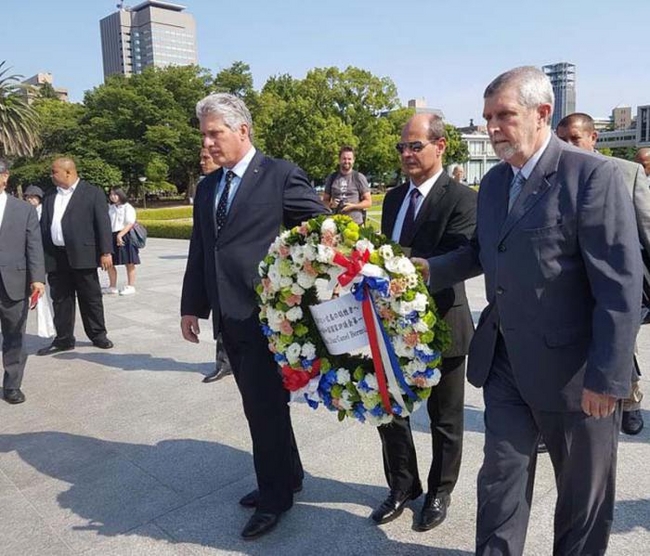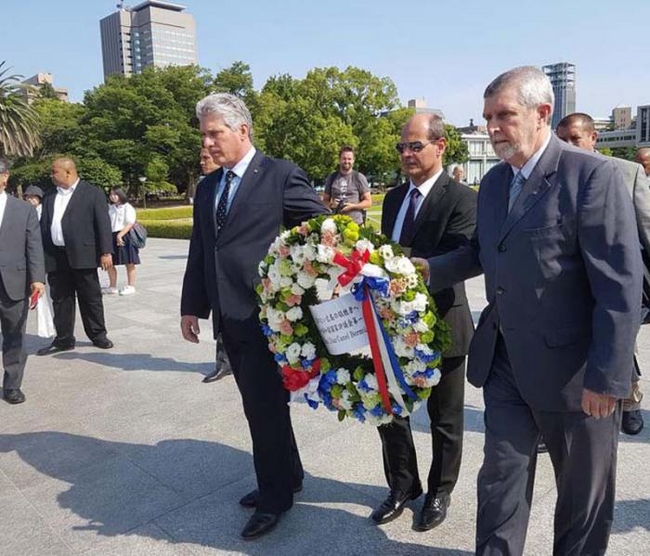Cuban First Vice President reiterates the need for nuclear disarmament in Hiroshima
Granma | Thursday, 2 June 2016 | Click here for original article

The First Vice President of the Councils of State and Ministers, Miguel Díaz-Canel, reaffirmed the steadfast commitment of his government to peace and called for nuclear disarmament, during a visit to the city of Hiroshima.
On arriving this Wednesday, June 1, Díaz-Canel was received by the Mayor of the Japanese city, Kazumi Matsui. The Cuban First Vice President, who is undertaking an official visit to Japan, welcomed the opportunity to learn more about Hiroshima, which he described as a heroic city, given the resistance of its people following the cruel and unjustifiable atomic bombing of August 6, 1945.
For over 50 years, the people of Cuba have been the target of continuous attacks. We share and understand the pain of the victims of the atomic bombing in Hiroshima and their relatives, Díaz-Canel stated, while he described the episode as criminal, unnecessary and morally unjustifiable.
Stressing the commitment of the Cuban government to peace and nuclear disarmament on a global scale, the First Vice President reiterated that Havana attaches high priority to strengthening, expanding and diversifying political, economic, commercial, financial, cultural and cooperation relations with Tokyo.
He also recalled the visit to Hiroshima by Comandante Ernesto Che Guevara in 1959, followed by the leader of the Cuban Revolution, Fidel Castro, in 2003.
Meanwhile, Matsui, also president of the Mayors for Peace organization, called on further municipalities of the Caribbean island to join up to this strategy. (Currently Havana and Santiago de Cuba are member cities).
Díaz-Canel signed the visitors’ book of the Hiroshima City Hall, expressing his interest and that of the Cuban government to expand ties of all kinds with the Land of the Rising Sun.
Earlier, accompanied by Deputy Foreign Minister Rogelio Sierra and Cuban Ambassador to Japan, Marcos Rodríguez Costa, the Cuban leader toured the Hiroshima Peace Memorial Museum.
At the end of the tour, Díaz-Canel signed the guest book dedicating his message to “a people capable of surviving and rebuilding and leaving a legacy of dignity that humanity must never forget.” He also ratified the same sentence written by the leader of the Cuban Revolution Fidel Castro on his visit to the site in 2003: “May such barbarity never happen again.”
On the second day of his official visit, Díaz-Canel also met with the Cuba-Japan Parliamentary Friendship League, in Tokyo, which expressed high interest in advancing trade and political cooperation with Havana.
Upon receiving the Cuban political, Keiji Furuya, chairman of the League, reviewed the progress of bilateral relations, especially in the last two years.
He recalled his visit to Havana in 2014 when, with a delegation of over 230 people, he held various exchanges and participated in the ceremony commemorating the 400th anniversary of the arrival in Cuba of the first Japanese samurai, Hasekura Tsunenaga.
Meanwhile, Díaz-Canel referred to a series of events that have influenced the revitalization of ties since 2014.
Among these, he highlighted the debt renegotiation with Japanese insurer Nippon Export and Investment Insurance (NEXI), an entity that intends to begin providing trade insurance for Japanese exports to Cuba once again.
He also noted the possibility, as studied this year, of the Japanese providing non-reimbursable funds and funding for major projects in health, agriculture, and cultural work in Cuba.
On concluding the meeting, Díaz-Canel expressed thanks for the role of the League in developing bilateral ties and invited the Asian archipelago, made up of some 6,852 islands, to seize the moment of updating the Cuban economic model, including aspects such as the new foreign investment law and the Mariel Special Development Zone, in order to increase the presence of Japanese businesses on the island.
On Friday, Díaz-Canel will conclude his visit to Japan, which seeks to boost trade relations and maintain the high level of political dialogue initiated with the country.







